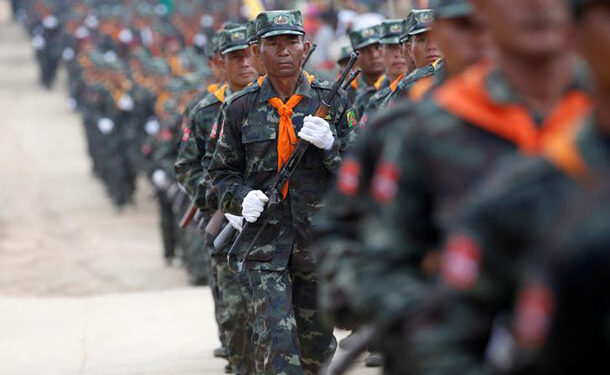RANGOON — More clashes have been reported between the Ta’ang National Liberation Army and the Shan State Army-South this week, with both armed groups trading blame over the cause of hostilities.
Fighting has been reported on successive days since Feb. 7 across three townships in northern Shan State—Namkham, Namhsan and Kyaukme.
According to local media reports, several hundred villagers from Tauk San in Kyaukme Township have fled their homes as clashes continue.
Col Sai Hla, a spokesperson for the Restoration Council of Shan State (RCSS), the political wing of the Shan State Army-South (SSA-S), claimed Ta’ang forces attacked their base in Namkham on Sunday.
“They came to attack our new base where we set up on a mountain. They could not take our mountain post as our armed forces fought back,” Sai Hla told The Irrawaddy.
“They burned some houses at a village in Kyaukme Township. They even arrested some villagers, including monks who tried to help the villagers escape.”
Tar Bong Kyaw, general secretary of the Ta’ang National Liberation Army (TNLA), denied the claims, while acknowledging that Ta’ang forces had arrested members of the RCSS.
The TNLA general secretary also repeated a claim, first leveled in November last year, that the SSA-S was cooperating with the Burma Army—an accusation the Shan armed group has repeatedly denied.
“The RCSS troops wait to fight us outside [Kyaukme] town in order to get help from the Burma Army,” said Tar Bong Kyaw, claiming that the SSA-S was able to freely pass through checkpoints manned by government troops in the area. He further alleged that the Burma Army had provided Shan forces with ammunition.
Speaking to The Irrawaddy, Col Sai Hla refuted the allegations which have been hotly debated among Burmese social media users this week.
The RCSS was among eight armed groups that signed the so-called nationwide ceasefire agreement (NCA) with the government in mid-October. The TNLA by contrast was not recognized by the government and excluded from the negotiations.
At a recent event to mark Shan National Day in Loi Tai Leng, the remote mountain headquarters of the SSA-S, RCSS chairman Lt-Gen Yawd Serk spoke positively of the ceasefire pact.
“Signing the NCA is a way to unity, as it is signed between the government and the armed groups of both sides who think for the public,” he told The Irrawaddy. “When the public cooperates, it will be successful.”
According to two Ta’ang civil society organizations, over 550 villagers from Law Naw in Namkhan Township have been forced to flee their homes due to ongoing hostilities.
In a joint statement released on Wednesday, the Ta’ang Women’s Organization and the Ta’ang Students and Youth Organization also alleged that the RCSS had been forcibly recruiting villagers in southern Shan State.
‘We Need to Fight Back’
Representatives of the United Nationalities Federal Council (UNFC) met with Yawd Serk in northern Thailand’s Chiang Mai in December in a bid to alleviate tensions in northern Shan State.
RCSS is not a member of the ethnic alliance, which includes the TNLA and whose membership is comprised of groups that opted against signing the NCA.
Nai Ron Tein, deputy communications officer for the UNFC, told The Irrawaddy this week that leaders of both sides may meet next week.
Both groups have accused the other of instigating the conflict which first broke out in November. TNLA leaders have viewed the clashes as playing to the time-honored divide-and-rule tactics of the former regime.
“The best solution would be if Yawd Serk’s troops go back to their place [in southern Shan State],” said Tar Bong Kyaw. “For us, we need to fight back as they came to take control of our area and we have no other options.”
The TNLA has in the past fought government troops alongside members of the Kachin Independence Army and the Arakan Army, further raising fears among some observers of the potential for this week’s fighting to cement divisions between ethnic armed groups.
“We do not want to fight against our ethnic armed groups,” said Sai Hla of the RCSS. “It is better to work out how we can stay as one community in Namkham.”

















